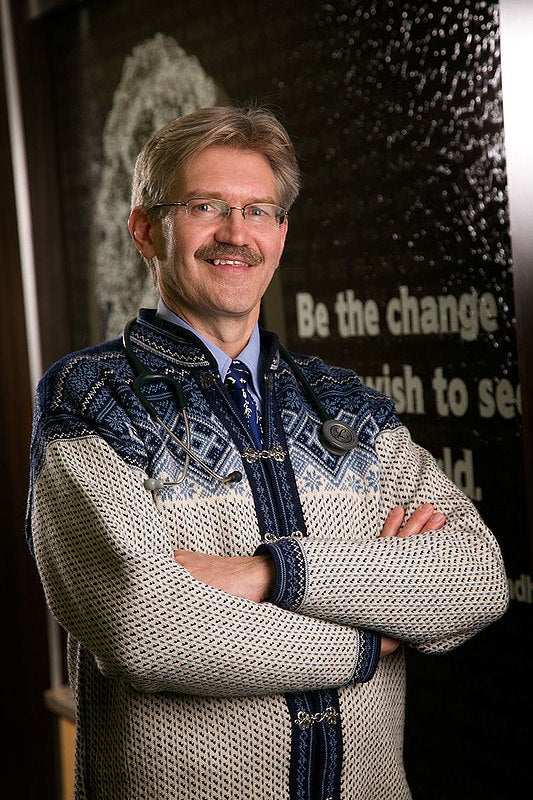Searching for a vaccine
by Kate Frentzel
Jon Temte ’80 jokes that he’s the rare medical doctor with a PhD in zoology, but it turns out there’s a logical connection. His research on seals, sea lions, and photoperiodism—the response of an organism to light and dark periods—got him interested in seasonality, which got him interested in influenza. This set him off on a decades-long career path that now has him advising the CDC on COVID-19 vaccine recommendations.

As a working physician and professor in the Madison, Wis., area, Temte splits his time between seeing patients, doing research, administering, and occasionally teaching.
Starting in 2004, he served as a liaison between the American Academy of Family Physicians (AAFP) and the Centers for Disease Control and Prevention’s Advisory Committee on Immunization Practices (ACIP). After four years, he was nominated as one of ACIP’s 15 voting members, and he’s served as the group’s chair. Since resigning from those roles in 2015, he’s continued to serve on ACIP work groups that make vaccine recommendations.
Temte has also been involved for decades with the Wisconsin Council on Immunization Practices, and he has a lot of research and policy experience with respiratory viruses including SARS and MERS. So when COVID became a growing concern, he was a natural choice to once again serve as the AAFP’s representative on a new ACIP work group formed specifically to make COVID vaccine recommendations. Essentially, its members weigh the pros and cons of potential COVID vaccines and plan for implementing nationwide vaccination efforts. To do this, they have to consider a complicated web of factors.
Temte says, “We’re very interested in the burden of illness—so asking who gets sick and what happens to them. Across age span and across various coexisting diseases and other factors, illness can present very differently, with very different outcomes. So you look at all that and at every available and prototype vaccine. Is it safe? Is it effective?”
In recommending vaccines, Temte’s group also considers accessibility. He explains, “If you have a safe and effective vaccine for the public, is it feasible? What is the cost-effectiveness? What are the values and preferences of the people who will be receiving it? And how do you most appropriately and fairly and ethically allocate that vaccine—which will most likely be in short supply—to potential recipients?”
The vaccines currently on the market are exceptionally safe, and Temte wants that trend to continue with any COVID vaccines, which unfortunately takes time. Two of the first steps in vaccine development are determining whether a vaccine encourages a subject to produce an antibody, and determining the correct dosage. These, Temte says, are the easy part.
Three challenges loom much larger in his mind: (1) testing the vaccine ethically in the real world; (2) proving that a vaccine is safe and effective not only for young and healthy people but also for older people and those with preexisting conditions; (3) making sure that any side effect is exceedingly rare.
Uncovering side effects usually involves very large numbers of subjects. “If there’s a rare event that occurs one out of every 100,000 vaccine recipients, you won’t catch that in a clinical trial,” Temte says. “All I can say is that for a vaccine you’re aiming at giving to 250 million people in this country, you have to be very, very cautious that you don’t cause any problems with it.”
In early June, Temte was simultaneously holding hope and skepticism over the possibility of a timely vaccine. But he puts a lot of faith in ACIP, calling himself “one of its biggest cheerleaders.” He’s confident that once there are vaccine options to work with, ACIP will steer the CDC in the right direction, recommending a treatment that is safe, accessible, and effective.